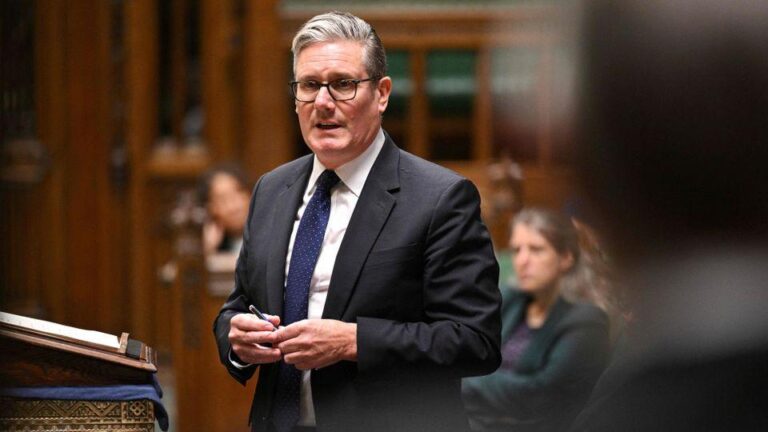In a significant development for European defense and security, UK Prime Minister Keir Starmer and French President Emmanuel Macron have announced plans to deepen cooperation on nuclear weapons coordination between their countries. The move, revealed during their recent summit, signals a renewed commitment to joint strategic efforts amid evolving geopolitical challenges. This closer UK-France collaboration aims to enhance deterrence capabilities and strengthen transnational defense ties in an increasingly uncertain global security landscape.
Starmer and Macron Signal New Era in UK France Nuclear Collaboration
UK Prime Minister Keir Starmer and French President Emmanuel Macron have jointly announced a transformative step toward enhanced nuclear cooperation between the two nations. This groundbreaking partnership aims to streamline strategic defense initiatives through shared research, joint training programs, and coordinated policy frameworks. Both leaders emphasized the importance of this collaboration in reinforcing European security and maintaining a credible nuclear deterrent amidst evolving global threats.
The announcement outlines several key areas of focus:
- Integrated nuclear command exercises to boost interoperability
- Collaborative development of next-generation nuclear technology
- Unified strategy on nuclear non-proliferation and arms control
| Collaboration Aspect | UK Contribution | France Contribution |
|---|---|---|
| Nuclear Research | Advanced reactor tech | Materials science expertise |
| Training Programs | Simulation facilities | Operational experience |
| Policy Coordination | Diplomatic channels | EU security influence |
Implications for European Security and Strategic Stability
The announcement of enhanced UK-France nuclear weapons coordination marks a significant evolution in European defense dynamics, signaling an unprecedented level of bilateral strategic integration. This collaboration aims to bolster deterrence capabilities amid rising geopolitical tensions in and around Europe. By aligning their nuclear postures more closely, London and Paris are addressing growing concerns over the shifting security environment, particularly in relation to Russian assertiveness and broader global nuclear proliferation challenges. Analysts suggest that this move could serve as a stabilizing force, promoting transparency and mutual trust between two of Europe’s foremost military powers.
However, this deepened partnership also introduces complex implications for the broader security architecture within the continent. Key potential impacts include:
- Enhanced deterrence synergy through joint doctrines and shared intelligence.
- Possible friction
- Heightened strategic ambiguity that may complicate crisis management scenarios.
- A framework for future multilateral nuclear cooperation among EU countries.
| Aspect | Potential Effect |
|---|---|
| Strategic Stability | Strengthened deterrence, risk of miscalculation |
| NATO Relations | Potential coordination challenges, integration opportunities |
| European Defense Autonomy | Increased self-reliance, influence on EU security policy |
The enhanced UK-France nuclear weapons coordination represents a notable shift in European defense strategy, reflecting a deeper bilateral effort to strengthen deterrence amid evolving geopolitical threats, especially from Russia. This cooperation is likely to improve deterrence synergy via joint doctrines and intelligence sharing, potentially stabilizing Europe’s strategic environment through greater transparency and trust.
However, it also poses challenges: it might generate friction within NATO due to perceptions of exclusivity, increase strategic ambiguity complicating crisis management, and influence the continent’s broader security architecture. On the positive side, it sets a precedent for possible future multilateral nuclear collaboration among EU nations.
The summarized potential effects are:
| Aspect | Potential Effect |
|————————-|—————————————————|
| Strategic Stability | Strengthened deterrence, risk of miscalculation |
| NATO Relations | Potential coordination challenges, integration opportunities |
| European Defense Autonomy | Increased self-reliance, influence on EU security policy |
Overall, this development could enhance European defense autonomy and the strategic posture of two leading military powers while requiring careful management of alliance dynamics and crisis communications.
Experts Call for Enhanced Transparency and Multilateral Oversight
In light of the newly announced UK-France nuclear weapons collaboration, specialists are urging for greater transparency to prevent the escalation of nuclear tensions on the global stage. Analysts emphasize that without clear visibility into the nature and scope of these initiatives, public trust and international stability could be jeopardized. They highlight that transparency is not only a matter of public oversight but also a strategic necessity to avoid misunderstandings among nuclear and non-nuclear states alike.
Furthermore, experts advocate for reinforced multilateral oversight involving international bodies such as the United Nations and the International Atomic Energy Agency (IAEA). These institutions could play a pivotal role in monitoring compliance, verifying disarmament commitments, and ensuring that enhanced cooperation between the UK and France does not undermine existing arms control treaties. Key recommendations include:
- Regular public reporting on joint nuclear activities
- Establishment of a trilateral review mechanism with allied nations
- Inclusive dialogue forums encompassing NATO and EU members
| Oversight Area | Proposed Action | Expected Outcome |
|---|---|---|
| Transparency | Mandatory declassification of joint exercises | Increased public trust |
| Verification | IAEA inspection enhancements | Improved treaty compliance |
| Multilateral Dialogue | Regular NATO and EU consultation meetings | Reduced geopolitical risks |
Concluding Remarks
As the UK and France deepen their nuclear cooperation, the announcement by Prime Minister Keir Starmer and President Emmanuel Macron marks a significant shift in European defense dynamics. This strengthened partnership underscores both nations’ commitment to collective security amid evolving geopolitical challenges. Observers will be closely watching how this enhanced coordination influences broader NATO strategies and the balance of power on the continent in the months ahead.




